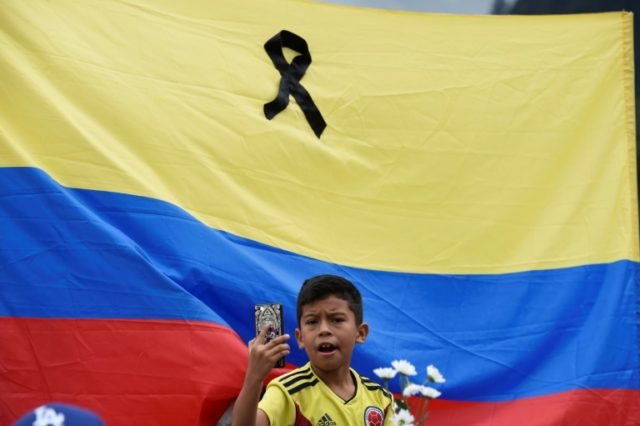Thousands of people took to the streets across Colombia on Sunday to protest terrorism after the Marxist terrorist group National Liberation Army (ELN) carried out an attack against a police academy last week.
Last Thursday, a suspected Marxist guerrilla belonging to the ELN targeted a graduation ceremony at General Santander police academy in Bogotá, exploding a Nissan Patrol loaded with the explosive pentolite by driving it into a wall. At least 21 were killed in the attack and dozens more were left with serious injuries.
During the anti-terrorism demonstrations on Sunday, in which both President Ivan Duque and former leader Juan Manuel Santos participated, protesters wore white clothing and waved white flags while chanting “no to violence” and “no more attacks on the police or the army.”
“Together, the government and society will work for Colombia and we will never give in when facing terrorism,” Duque told the rally in Bogotá’s Plaza Bolivar. “Colombia is strong and will never be scared, it will never be intimidated by criminals.”
In the city of Medellín, images of the victims were projected on to big screens in the city’s Plaza de las Luces while policemen held portraits of their deceased colleagues and sang the Colombian national anthem.
On Friday evening, Duque ruled out a return to negotiations with the ELN, who have stationed ten prominent commanders in Cuba with the aim of reopening talks with the government. The Colombian government has demanded their extradition, although the Cuban regime has refused, citing a lack of guarantees for their safety.
Duque campaigned for the presidency with the support of conservative former President Álvaro Uribe, whose tenure was marked by the near-complete destruction of the Revolutionary Armed Forces of Colombia (FARC). Santos, Uribe’s successor, chose dialogue and legitimization of the FARC, which emboldened their drug trafficking and violence.
In 2016, former President Juan Manuel Santos forced through a widely unpopular peace agreement with the FARC designed to bring an end to the country’s longstanding civil war, despite its rejection via a nationwide referendum demanding its approval.
The deal has failed to stem the flow of violence as other guerilla groups have expanded their operations. Other indications suggest the FARC, despite now being recognized as a political party with guaranteed seats in the Colombian Congress, continues to engage in violence and drug trafficking.
Duque’s refusal to collaborate with the ELN highlights the difference between the current era and the Santos administration’s approach.
“The list of terrorist attacks, kidnappings and crimes is well known to all Colombians,” he said. “The ELN has shown the undeniable thread that guides them, none other than contempt for life.”
For many Colombians, last week’s attack represented a troubling return to the troubles of the past, as the country has long suffered the violence of communist guerilla groups and drug trafficking organizations.
Follow Ben Kew on Facebook, Twitter at @ben_kew, or email him at bkew@breitbart.com.

COMMENTS
Please let us know if you're having issues with commenting.